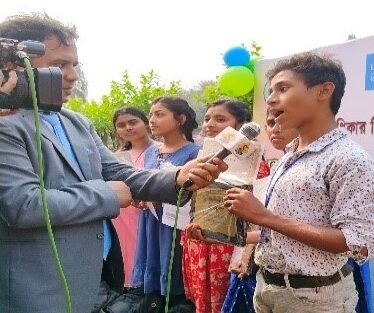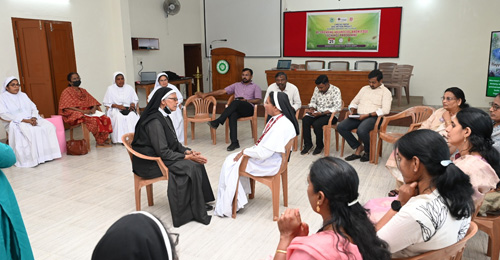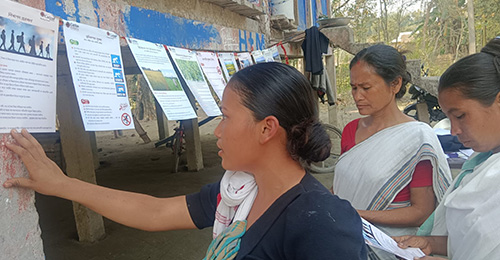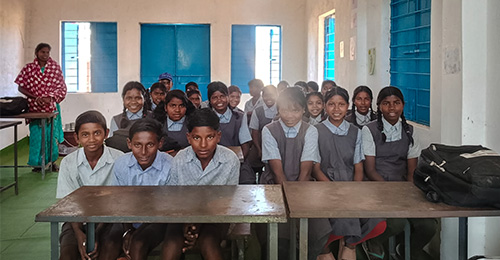Mohiuddin’s Courageous Stand Against Child Marriage

The commitment to end child marriage in India has seen a significant improvement over the years. The National Family Health Surveys from 1993 to 2021 show child marriage among girls in India has decreased from 49.4% in 1993 to 22.3% in 2021. The Government, Civil Society organizations, and people at large have demonstrated a strong fight against this social evil. However, there is a lot more that needs to be done considering the population and spread of India. Everyone is working to build a constructive environment for children so they can grow to their full potential and become responsible citizens.
Caritas India, through her ‘Surokhit Shaishav’ program, is at the forefront of this transformative journey. Operating in 10 districts of West Bengal, Assam, and Uttar Pradesh, the program aims to promote safe childhood and combat various forms of exploitation. It endeavors to improve the implementation of child-centric government policies and programs while reducing the vulnerabilities of children and young adults to all forms of violence across the intervention states.

Within this program, there lies hope, embodied by individuals like Mohiuddin Sardar. A member of the Surokhit Shaishav Child Club in Merudandi village in North Twenty-Four Parganas district in West Bengal, Mohiuddin’s courageous actions exemplify the impact of the Surokhit Shaishav program. His unwavering resolve to prevent Elina Khatun’s forced marriage not only saved her from a life-altering fate but also showcased the power of collective action and awareness.
Elina Khatun, a young girl determined to complete her education, found herself facing the specter of forced marriage arranged by her own parents. Despite her protests falling on deaf ears, Elina refused to succumb to societal pressure, determined to assert her rights as a child. Mohiuddin, her classmate and a fellow member of the Child Club, became aware of her plight and immediately sprung into action.
Armed with courage and conviction, Mohiuddin rallied his peers and sought assistance from community-based organizations and the Surokhit Shaishav project. Despite facing opposition from his own parents and reluctance from authorities, Mohiuddin persevered, refusing to abandon his mission to save Elina. With the collaborative efforts of dedicated advocates and local law enforcement, the wheels of justice began to turn.
Thanks to the proactive intervention of the Kolkata Mary Ward Social Centre, a valued partner of the Surokhit Shaishav program, the Basirhat Police station swiftly registered the complaint and took decisive action. Recognizing the urgency of the situation, the police ensured that the girl’s parents signed a legal bond, committing to refrain from arranging her marriage until she reaches the legal age. This collaborative effort between the Surokhit Shaishav program and law enforcement highlights the power of partnership in safeguarding the rights and well-being of vulnerable children.
Through unwavering determination and collective action, Mohiuddin and his allies succeeded in thwarting Elina’s forced marriage, ensuring her freedom and the continuation of her education. This triumph not only underscores the impact of the Surokhit Shaishav program but also serves as a testament to the power of children as agents of change in their communities.
The Surokhit Shaishav program, with its emphasis on empowering children and fostering awareness, continues to pave the way for a safer and more equitable future. Mohiuddin’s bravery stands as a shining example, inspiring others to stand up against social injustices and champion the rights of every child. As we celebrate his courage and resilience, let us recommit ourselves to the cause of child empowerment, ensuring that every child’s voice is heard and their rights respected.
Upcoming News
Strengthening grassroots recovery in Wayanad through Safe Within Project
Caritas India strengthened community centred disaster recovery through a four day accompaniment support visit to...
LEARN MOREFlood‑prone communities in Assam and Tripura are better prepared through We4Resilience
The We4Resilience Campaign under Caritas India’s SARAL (Strengthening Adaptation, Resilience and Livelihoods) project, supported by...
LEARN MOREChildren Lead the Fight for Safe Education
In Remhla, a small forest-surrounded village in the Sarguja district of Chhattisgarh, the middle school...
LEARN MORE



 91 -11 - 2336 3390
91 -11 - 2336 3390  director@caritasindia.org
director@caritasindia.org 